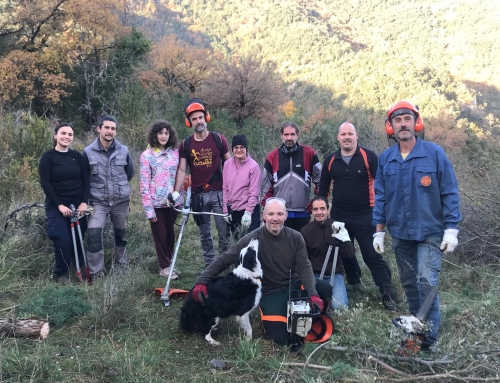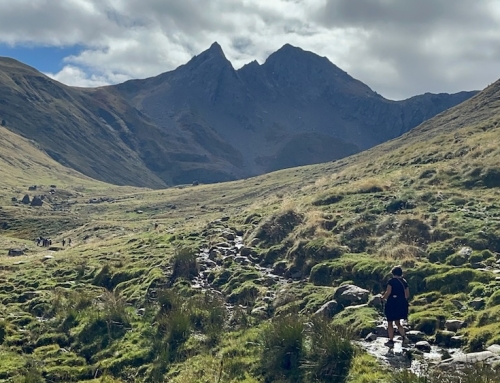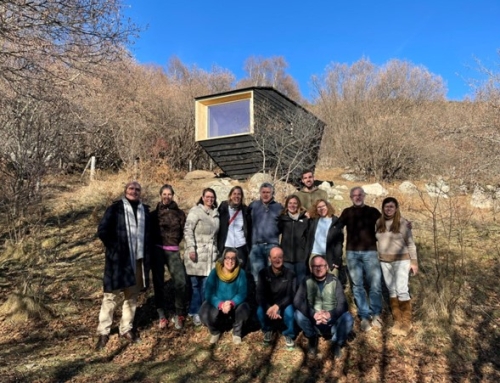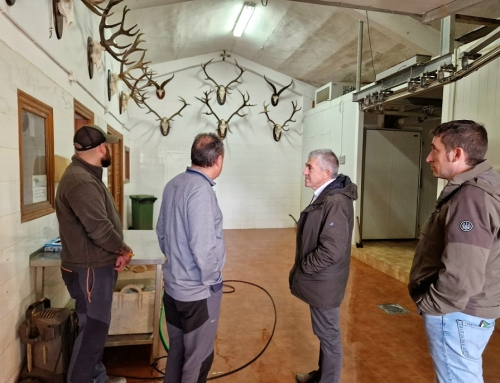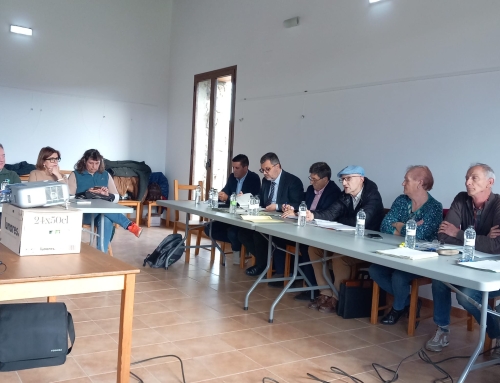
The political branch, PP-PSOE-PAR, of the energy lobby reiterates its intention to destroy the Maestrazgo.
During this past Thursday there were several reports on the invasive implementation of renewable energy plants in Aragon.
While the TC annulled the Aragonese Law, the plenary of the Cortes rejected to defend the natural and singular space of Maestrazgo from the ecocide programmed by the multinationals, and at the gates of La Aljafería the Aragonese civil society demanded sanity and common sense to deploy renewables without destroying landscapes and landscapes, for which it demands the paralysis of the nonsense known as Clúster Maestrazgo.
The autumn has entered Aragon atmospherically cool, but socio-politically speaking warm.
This Thursday, information about the invasive and extractivist implementation of renewable energy plants in Aragon followed one after the other throughout the day.
While it was known ‘a foretaste’ of the TC ruling that annuls the Aragonese Renewable Energy Law, the plenary of the Aragonese Parliament rejected to defend the natural and unique space of Maestrazgo from the ecocide programmed by multinationals by rejecting with the votes of the political branch of the energy lobby, PP-PSOE-PAR, different PNLs presented by the parliamentary groups to defend the valuable and unique nature of the southern Aragonese region.
And, in turn, at the gates of La Aljafería, Aragonese civil society demanded sanity and common sense to deploy renewables without destroying landscapes and landscapes, and demanded, especially, the stoppage of the nonsense known as Cluster Maestrazgo.
Social rejection to the installation of renewable energy projects in the Natura 2000 Network and request to stop the Maestrazgo Cluster The entities Platform for the Landscapes of Teruel, Platform in Defense of the Mountains of Aragon (PDMA), Fundación Quebrantahuesos and Ecologists in Action Aragon convened a media event on Thursday afternoon at the gates of La Aljafería.
The Natura 2000 Network is a European ecological network of biodiversity conservation areas, whose purpose is to ensure the long-term survival of species and habitat types in Europe, helping to halt the loss of biodiversity.
Being the main instrument for nature conservation in the European Union.
“It is therefore incongruous and unacceptable that these areas are used in whole or in part for the installation of electricity generation projects that entail significant impacts on biodiversity,” say Ecologists in Action Aragon.
Despite the above, on July 23, 2024 the Council of Ministers approved the authorization of the implementation of 20 wind farms for electricity production that make up the project called Clúster del Maestrazgo.
If this macro wind project goes ahead, it would have serious irreversible ecological impacts on protected areas of high environmental value in the Aragonese regions of Maestrazgo and Gúdar-Javalambre.
“A cluster that is far removed from the energy model and implementation of renewable energy that Ecologists in Action defends”, for the environmental organization “this is a clear example of an inefficient model, with huge costs for the production and export over long distances of large amounts of energy, which is also leading to the occupation of land with high social and environmental value.” This mega-project of 20 wind farms is located, for the most part, in natural spaces in sparsely populated areas, which are part of the last great reserves of biodiversity in Aragonese, Iberian and European soil, and with an installed-projected power of 882 megawatts, it would be one of the largest in the world.
The Maestrazgo Cluster involves the implementation of 125 large-scale wind turbines, 200 meters high and 158 meters in blade diameter, to which would be added 173 kilometers of high-voltage lines and 327 kilometers of roads and highways.
“In total, the affected area occupies an enormous surface of about 72,000 hectares,” Ecologists in Action emphasizes. Irreversible and large-scale deterioration of valuable and protected natural areas According to the Environmental Impact Statement of the megaproject issued by the Ministry for Ecological Transition and the Demographic Challenge (MITECO), 14 of the 20 wind farms and 84 of the 125 wind turbines will be installed in areas of the Natura 2000 Network “specifically in two special conservation areas ZEC ‘Maestrazgo y Sierras de Gúdar’ and ZEC ‘Rambla de las Truchas’. Likewise, other areas will be affected by the electricity and road infrastructures (a ZEC in Teruel and a SCI and a SPA in Castelló)”, according to Ecologists in Action, which adds that the Spanish State Government “has authorized this megaproject contradicting the criteria set by the MITECO itself to establish the ‘Zoning of environmental sensitivity for the establishment of wind farms’, in which the Red Natura 2000 areas are considered in the highest degree of sensitivity and, therefore, should be excluded from the installation of wind farms”.
“At the same time, it has carried out an environmental impact assessment on the Natura 2000 Network and on biodiversity tailored to the interests of the developer, overlooking the devastating effect that the massive occupation of these areas by the megaproject will have”, they emphasize.
In relation to biodiversity, the EIS “is limited to focus attention on palliative measures for wildlife collisions and compensatory replanting of damaged habitats, omitting to apply the basic fundamentals of the Birds and Habitats Directives that govern this type of situation. One of them, fundamental, is that no alternatives to the project have been proposed outside the Natura 2000 Network, a sine qua non condition expressed in the European directives and in state legislation”, the social organizations remind us.
In Aragon, the surface area occupied by the Natura 2000 Network in the terrestrial environment represents 28.5% of the country’s territory “so that if the need for the project were justified, there would be a lot of territory that MITECO itself recognizes as having low or no environmental sensitivity where alternatives could have been sought”, say Ecologists in Action.
On the other hand, “it lacks all sense to intensify the degradation of the environmental values of these scarce protected areas, when they are a fundamental tool in the European strategy to cushion the socio-environmental ravages of the global overheating in progress”, they assure.
This macro wind turbine project in Maestrazgo and the Gúdar-Javalambre region establishes “a worrying precedent of violation of environmental regulations and unnecessary sacrifice of protected natural areas, in which above other economic interests must prevail the conservation and renaturalization of these valuable and unique environmental goods and services that receive recognition and are subject to legal protection,” emphasize the entities.
“The impact on biodiversity will also be reflected in the destruction of hundreds of thousands of adult and wild trees interwoven with biodiversity in ecosystemic communities. High voltage power lines will require deforestation of a minimum of 90 meters in width where they pass through. Hundreds of kilometers of new and expanded runways will also be razed where they pass, with widths greater than that of a highway. Huge concrete bases to support large windmills will also eliminate entire forested areas. In turn, no matter how many palliative measures are proposed, thousands of birds and bats in the area run the risk of dying every year from collisions with the mega-wind turbines and power lines,” the environmental organizations sadly report. The Maestrazgo Cluster “will invade, cut up and reduce the multidiverse life generating multiple damages and irreparable environmental damage on unique habitats that are refuge for 33 protected species included in the ‘Birds Directive’ of the European Union, 28 species of animals included in the Catalogue of Threatened Species, and 12 plant species listed as endangered or threatened,” detailed from Ecologists in Action.
The proposals of the so-called ‘compensatory measures’ to alleviate these environmental and ecosocial ills “cannot repair the deep and irreversible damage to ecosystems and biodiversity, which in turn will revert on human populations and their local economies. Reforestation by planting small trees to replace the complex natural systems of mature forests and their symbiotic communities with plant species and wildlife, in no case can match or replace the immeasurable value of these natural habitats engendered for centuries that has been preserved,” say the environmental organizations.
In the face of the climate emergency and the loss of biodiversity, and in the face of the multiple ecological and social dangers, “it is essential to substantially reduce the consumption of fossil and nuclear fuels and their polluting emissions into the atmosphere through a systemic transformation within the limits of the planet,” say the organizations, which add that “the Maestrazgo Cluster, subsidized with public money from an international investment fund, Copenhagen Infrastructures Partners, obeys its shareholders and not the needs of the local territory, nor its inhabitants or the public good. It is a project opposed to a decentralized model of renewables rooted in local communities,” which is what Ecologistas en Acción is committed to “where the fight against climate emergency and the conservation of ecosystems go hand in hand,” they conclude.
The political branch of the energy lobby reiterates its intention to destroy the Maestrazgo Despite the strong and reasoned arguments and all the above, the powerful political branch of the energy lobby, PP-PSOE-PAR, is deaf to common sense and rationality.
Thus, the sum of the votes of these three parties with identical political positions on the uncontrolled deployment of renewable energy plants throughout the Aragonese territory, prevented last Thursday afternoon the approval of PNLs submitted by several parliamentary groups (Aragon Teruel Existe, CHA, and even the ultra-right Vox, which in this matter is dissociated from its former partners of PP-PAR) to defend the Maestrazgo.
In his defense of the PNL, Tomás Guitarte, spokesman for Aragón – Teruel Existe, reproached “the Azcón government for not defending the Maestrazgo before the courts with the same passion that it rejects the Amnesty Law”.
Guitarte accused “the PSOE of provoking the ecocide of Maestrazgo, and the PP of being an accomplice for not having mobilized after reaching the Pignatelli”.
The deputy also pointed out that “some put the influence (Forestalia) and others the money (CIP), to move forward with a speculative project. It is the perfect example of everything that is done wrong. The natural and cultural heritage is at stake and Maestrazgo does not deserve it,” he said.
In the same line, the national president of CHA and spokesman in the Parliament, Joaquín Palacín, who emphasized “the need to reorganize the implementation of wind and solar farms”. Also urging “the DGA to act in defense of the territory”, proposing “a change of energy model”, and rejecting the “Maestrazgo Cluster for its impact on an area of high environmental and cultural sensitivity”.
The vote on the three PNLs took place separately, and the signatory formations were joined by the votes of Podemos Aragón (telematically), and IU Aragón, whose spokesman, Álvaro Sanz, however, reproached the ultra-right Vox that “did nothing in his year in the Pignatelli”, and recalled that “the Council for the Protection of Nature already raised in 2022 a moratorium to plan renewables”.
Source: https://arainfo.org/la-rama-politica-pp-psoe-par-del-lobby-energetico-reitera-su-intencion-de-destruir-el-maestrazgo/

